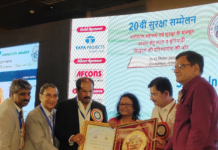The public-private partnership (PPP) projects aim to internalize the externalities and are designed to tap the USPs of both the public and private sector. The bankable PPP projects have all the ingredients of success, as they will not face the problem of funding, said the S.V.R Srinivas, Additional Metropolitan Commissioner & Projects Director of MMRDA
He was inaugurating a workshop on Preparation of Bankable Projects – Formulation, Appraisal & Implementation, jointly organized by the Indian Merchants Chamber and Consulting Engineering Services Ltd. on February 7.
While welcoming Mr. Srinivas and other speakers, Mr. Niranjan Hiranandani, Vice President, IMC, said that the Government was now planning to implement many ambitious infrastructure projects such as the Mono-Rail, Mumbai Trans Harbour Link (MTHL), Coastal Road, Navi Mumbai International Airport amongst others. In view of this, the workshop is highly significant at the present juncture, he added.
The IMC Vice-President also felicitated Prof. S.S.Chakraborty, CMD of Consulting Engineering Services (P) Ltd, on his winning the Life Time Contribution Award in Engineering 2011 from the Indian National Academy of Engineering.
Among the distinguished speakers who addressed the workshop included- Mr. R.Ramana, Additional Chief (Transport Planning), MMRDA; Mr. Manish Rege, Asst. Vice-President (Infrastructure) IL&FS; Mr. Amitabh Sharma, Senior Partner, Khaiton & Co; Mr. Sanjay Kabra, CFO, Mr. Sunil Mantri Reality Ltd; Mr. Ajay Saxena, PPP expert, Asian Development Bank; Mr. Shiva Rajaraman, General Manager, L&T Infrastructure Finance Company Ltd.; Mr. Ramkumar N, AGM, ICICI Bank and Mr. Ajay Dwivedi, Director, CRISIL Risk & Infrastructure Solutions Ltd. Mr. Rajat Kumar Singh, Senior Vice President (Finance) & Head – Project Finance, Reliance Infrastructure Ltd, Reliance ADA, Mr. Sudhir Jaiswal, VP Head, Corporate Project Engineering, Mahindra & Mahindra.
Mr. Srinivas said that bankability of a project cannot be decided entirely on the basis of market response, because the market does not always respond accurately due to the gaps in availability of information. He added that it was necessary to minimize projects risks, so that, the cost of risk is not passed on to the consumers.
Prof. Chakraborty said that infrastructure of a large city like Mumbai should not be planned and implemented in a piece-meal manner. These projects should be linked together and taken up holistically.
Stressing on the need to improve the delivery mechanism of services, Mr. Manish Rege said that it was necessary to identify the needs and objectives of a project and conduct a pilot study before the actual launch.
PPP expert, Mr. Ajay Saxena presented a comprehensive view on the issue of project appraisal with due focus on the interests of the stakeholders, fair allocation of risks and rewards, role of the Regulatory framework and others.
Mr. Amitabh Sharma, Senior Partner, Khaiton & Co. addressed the workshop with a unique legal perspective emphasizing on the risk element with the case study of the Indonesian Coal Crisis.
Mr. Shiva Rajaraman said that the government had been encouraging generation of renewable energy. Now, many solar and wind power projects are being implemented in India. Also, India has a solar radiation intensity of 4.7 kwh for sq.mt per day. This means that it has a net PLF of 16% – 20%, depending on locations.”
Speaking on ‘Optimal risk sharing frameworks, Mr Ajay Dwivedi, Director, CRISIL Risk & Infrastructure Solutions Ltd said that the PPP model of infrastructure projects have a great advantage of optimally tapping the synergies of both the public and private sector.
During the Ex-post Evaluation session of the workshop, Mr. Rajat Kumar Singh, Senior Vice President (Finance) & Head – Project Finance, Reliance Infrastructure Ltd. & Mr. Sudhir Jaiswal, VP Head, Corporate Project Engineering, Mahindra & Mahindra discussed about the challenges faced in the actual implementation phase of the project. Mr. Rajat Kumar Singh, also made a detailed presentation on the current Metro Rail Project, Mumbai.
The discussions at the workshop highlighted on the key issues, challenges and strategies required for the development of bankable projects established on the sound pillars of efficiency and accountability.






























